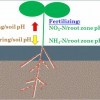Abstract
Soil pH is one of the most important soil chemical properties and affects nutrient bioavailability and microbial activity. The purpose of this article is to provide an overview for faculty, crop consultants, crop advisors, fruit growers, and students who are interested in fruit production. The crop response to soil pH varies due to crop genetic diversity. Soil pH determines nutrient bioavailability and hence fruit growth, yield, and quality. This 6-page fact sheet was written by Guodong Liu, Rao Mylavarapu, Ed Hanlon, and Wei Chieh Lee, and published by the UF Department of Horticultural Sciences, April 2014.
HS1234/HS1234: Soil pH Management for Optimum Commercial Fruit Production in Florida (ufl.edu)
References
Burr, T. J., A. Caesar, and M. N. Schrolh. 1984. Beneficial plant bacteria. Critical Reviews in Plant Sciences. 2(1): 1-20. https://doi.org/10.1080/07352688409382186
Childers, N. F., J. R. Morris, and G. S. Sibbett. 1995. Modern Fruit Science: Orchard and Small Fruit Culture (10th Edition). Horticultural Publications, Gainesville, Florida.
Gundale, M. J. and T. H. DeLuca. 2006. Temperature and substrate influence the chemical properties of charcoal in the ponderosa pine/Douglas-fir ecosystem. Forest Ecology and Management. 231 (1-3): 86-93. https://doi.org/10.1016/j.foreco.2006.05.004
Havlin, J. L., J. D. Beaton, S. L. Tisdale, and W. L. Nelson. 2005. Soil Fertility and Fertilizers: An Introduction to Nutrient Management. Upper Saddle River, NJ: Pearson Education.
Kering, M. K. and M. L. Kaps. 2004. Soil pH affects growth and nutrient content of grapes. HortScience. 39(4): 827. https://doi.org/10.21273/HORTSCI.39.4.827B
Herath, H. M. E. 1967. Some effects of water table, pH, and ammonium and nitrate nitrogen upon the growth and composition of highbush blueberry. Thesis of Master of Science at the University of British Columbia. Available online at https://circle.ubc.ca/bitstream/handle/2429/36169/UBC_1967_A4%20H47.pdf?sequence=1.
Obreza, T. A. and M. E. Collins. 2002. Common soils used for citrus production in Florida. SS403. Gainesville: University of Florida Institute of Food and Agricultural Sciences. http://edis.ifas.ufl.edu/SS403.
Odneal1, M. B. and M. L. Kaps. 1990. Fresh and Aged Pine Bark as Soil Amendments for Establishment of Highbush Blueberry. 25(10): 1228-1229. https://doi.org/10.21273/HORTSCI.25.10.1228
Retamales, J. B. and J. F. Hancock. 2012. Blueberries. Crop Production Science in Horticulture 21. CABI, Cambridge, MA.
Shober, A. L., C. Wiese, and G. C. Denny. 2011. Soil pH and the home landscape or garden. SL 256, Gainesville: University of Florida Institute of Food and Agricultural Sciences. http://edis.ifas.ufl.edu/ss480. https://doi.org/10.32473/edis-ss480-2011
Splittstoesser, W. E. 1990. Vegetable Growing Handbook: Organic and Traditional Methods (3rd ed.). New York: Chapman & Hall.
Tagliavini, M., J. Abadía, A. D. Rombolà, A. Abadía, C. Tsipouridis, and B. Marangoni. 2008. Agronomic means for the control of iron deficiency chlorosis in deciduous fruit trees. Journal of Plant Nutrition. 23(12-12): 2007-2022. https://doi.org/10.1080/01904160009382161
Tucker, D. P. H., J. S. Rogers, E. W. Stover, and M. R. Ziegler. 2007. Florida Citrus: A Comprehensive Guide. IFAS Communication Services. Gainesville: University of Florida Institute of Food and Agricultural Sciences.
USDA (United States Department of Agriculture). 1985. Soil Survey of Alachua County Area, Florida. Natural Resources Conservation Service. Accessed July 16, 2013. http://soils.usda.gov/survey/online_surveys/florida/.
USDA (United States Department of Agriculture). 1990a. Soil Survey of Hendry County Area, Florida. Natural Resources Conservation Service. Accessed July 16, 2013. http://soils.usda.gov/survey/online_surveys/florida/.
USDA (United States Department of Agriculture). 1989. Soil Survey of Highlands County Area, Florida. Natural Resources Conservation Service. Accessed July 16, 2013. http://soils.usda.gov/survey/online_surveys/florida/.
USDA (United States Department of Agriculture). 1990b. Soil Survey of Polk County Area, Florida. Natural Resources Conservation Service. Accessed July 16, 2013. http://soils.usda.gov/survey/online_surveys/florida/.
USDA (United States Department of Agriculture). 1993. Soil Survey Manual: Chapter 3. Natural Resources Conservation Service. Accessed July 16, 2013. http://soils.usda.gov/technical/manual/contents/chapter3.html.
Wight, A. N., A. X. Niemiera, J. R. Harris, and R. D. Wright. 1999. Micronutrient Fertilization of Woody Seedlings Essential Regardless of Pine Bark pH. Journal of Environmental Hortculture 17(2): 69-72. Available online at http://www.hriresearch.org/docs/publications/JEH/JEH_1999/JEH_1999_17_2/JEH%2017-2-69-72.pdf. https://doi.org/10.24266/0738-2898-17.2.69

